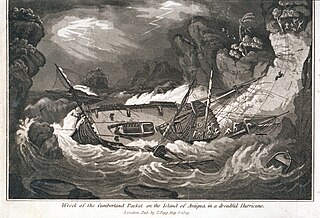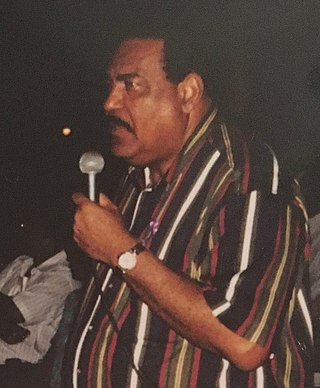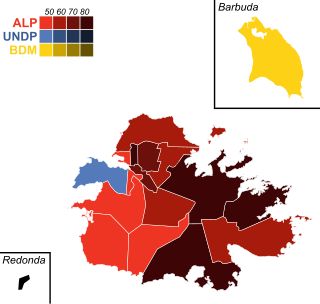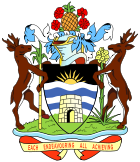
Antigua and Barbuda is a sovereign island country in the Caribbean. It lies at the conjuncture of the Caribbean Sea and the Atlantic Ocean in the Leeward Islands part of the Lesser Antilles.

The history of Antigua and Barbuda covers the period from the arrival of the Archaic peoples thousands of years ago to the present day. Prior to European colonization, the lands encompassing present-day Antigua and Barbuda were inhabited by three successive Amerindian societies. The island was claimed by England, who settled the islands in 1632. Under English/British control, the islands witnessed an influx of both Britons and African slaves migrate to the island. In 1981, the islands were granted independence as the modern state of Antigua and Barbuda.

Sir Lester Bryant Bird was an Antiguan politician and athlete who served as the second prime minister of Antigua and Barbuda from 1994 to 2004. He was chairman of the Antigua Labour Party (ALP) from 1971 to 1983, then became prime minister when his father, Sir Vere Bird, the previous prime minister, resigned.

The United Progressive Party is a political party in Antigua and Barbuda. It was previously led by Baldwin Spencer, it was the governing party from 2004 to 2014. It has been in opposition since the 2014 election and is now led by Harold Lovell. However, Harold recently resigned on Friday 20 January 2023. As a result, Jamale L. Pringle is now leader of the party..

Elections in Antigua and Barbuda take place in the framework of a parliamentary democracy.

The Barbuda People's Movement is a centre-left Barbudan nationalist political party in Antigua and Barbuda active only on the island of Barbuda. The party's symbol is the European fallow deer, national animal of Barbuda. The party seeks the secession of Barbuda from Antigua and Barbuda.

The Progressive Labour Movement was a major centre-left political party in Antigua and Barbuda and, until the 2000s, was the only political party to have defeated the Antigua Labour Party in an election.

The United National Democratic Party was a political party in Antigua and Barbuda. It contested the 1989 general elections, winning 31% of the vote but only one seat. In 1992 it was one of three opposition parties to merge into the United Progressive Party.

The Antigua Freedom Party was a political party in Antigua and Barbuda led by George "Rick" James.

General elections were held in Antigua and Barbuda on 8 March 1994. They were won by the governing Antigua Labour Party under the leadership of Lester Bird. Bird had been appointed leader of the ALP before the elections, after his father and predecessor Vere Bird announced his intention to retire. Lester Bird became Prime Minister after elections. Voter turnout was 62.3%. This was the first election contested by the United Progressive Party, under future Prime Minister Baldwin Spencer.

General elections were held in Antigua and Barbuda on 9 March 1989, the second after it had become an independent Commonwealth realm. The elections were won by the governing Antigua Labour Party (ALP), whose leader Vere Bird was reelected as Prime Minister. Voter turnout was 60.7%.

General elections were held in Antigua and Barbuda on 17 April 1984, the first after the country had become an independent Commonwealth realm in 1981.

General elections were held in Antigua and Barbuda on 1 November 1956. The Antigua Labour Party retained all eight elected seats and the party's leader Vere Bird became Minister of Trade and Production after a ministerial system of government was established. Voter turnout was 57%.

General elections were held in Antigua and Barbuda on 29 November 1965, and continued on 15 December after three candidates withdrew before the original date. They were won by the governing Antigua Labour Party (ALP), whose leader Vere Bird was re-elected as Chief Minister.

General elections were held in Antigua and Barbuda on 11 February 1971. They were won by the Progressive Labour Movement. PLM leader George Walter was elected Premier of Antigua, defeating the incumbent Premier Vere Bird of the Antigua Labour Party. The PLM was founded in 1967 after a split in the leadership of the Antigua Trades and Labour Union; this was its first election, as well as its first and only electoral victory.

General elections were held in Antigua and Barbuda on 18 February 1976. Whilst the Progressive Labour Movement received the most votes, the opposition Antigua Labour Party won more than double the number of seats. ALP leader Vere Bird was elected Premier of Antigua. Bird had previously served as head of government of Antigua and Barbuda between 1960 and 1971. He defeated the incumbent Premier George Walter of the Progressive Labour Movement.

General elections were held in Antigua and Barbuda on 24 April 1980. They were won by the governing Antigua Labour Party. ALP leader Vere Bird was re-elected as Prime Minister of Antigua and Barbuda. Voter turnout was 77.1%.
The Antigua National Party was a political party in Antigua and Barbuda. The only general elections it contested were those of 1956. Despite receiving 12.5% of the vote, they failed to win a seat.
The Antigua and Barbuda Democratic Movement (ABDM) was a political alliance in Antigua and Barbuda. It included the Antigua Democratic Labour Party and the Barbuda Democratic Movement and was led by Robert Hall.

General elections were held in Antigua and Barbuda on 12 June 2014. The result was a victory for the opposition Antigua and Barbuda Labour Party led by Gaston Browne, which won 14 of the 17 seats. Following the election, Browne became the country's youngest Prime Minister.




















